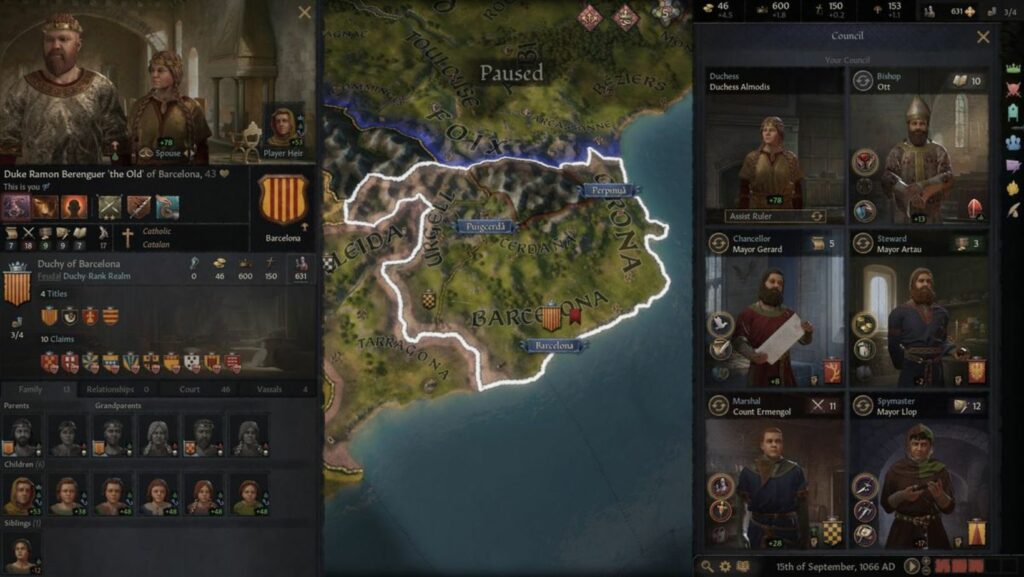
Crusader Kings 3 Tips
When diving into the intricate world of Crusader Kings 3 tips, navigating the complexities of medieval dynasties can be both exhilarating and  daunting. As an experienced player, I’ve honed several TIPS that can help novices and veterans alike elevate their gameplay. Whether you’re aiming to expand your realm or secure your lineage, these insights are designed to sharpen your strategic acumen.
daunting. As an experienced player, I’ve honed several TIPS that can help novices and veterans alike elevate their gameplay. Whether you’re aiming to expand your realm or secure your lineage, these insights are designed to sharpen your strategic acumen.
One crucial aspect to master in Crusader Kings 3 tips is understanding the importance of alliances and vassals. By forging strategic partnerships with other rulers through marriage or treaties, you can bolster your military strength and political influence. Additionally, effectively managing vassals by balancing power dynamics within your realm is key to maintaining stability and quelling rebellions.
Furthermore, delving into the intricacies of succession laws and inheritance systems is paramount for long-term success in Crusader Kings 3 tips. Planning ahead and grooming suitable heirs while navigating potential rival claimants can determine the fate of your dynasty. Embracing a proactive approach to succession planning can ensure a smooth transition of power and prevent internal strife within your realm.
Understanding Crusader Kings 3
Crusader Kings 3 tips is a grand strategy game developed by Paradox Interactive, known for its depth and complexity. At its core, the game simulates medieval dynasties’ rise and fall, where players control a noble house through generations. Unlike traditional strategy games that  focus solely on warfare, CK3 incorporates intricate elements of politics, diplomacy, and family dynamics. It’s this blend of strategic gameplay that sets it apart from other titles in the genre.
focus solely on warfare, CK3 incorporates intricate elements of politics, diplomacy, and family dynamics. It’s this blend of strategic gameplay that sets it apart from other titles in the genre.
Key Features of Crusader Kings 3:
- Dynasty Building: Players must strategize not just for themselves but for their dynasty’s longevity. Succession planning and ensuring strong heirs are crucial.
- Intricate Relationships: Diplomacy plays a significant role as alliances can make or break your house’s standing. Knowing when to form bonds or betray allies is key.
- Character Development: Each character has their own traits and ambitions, influencing decisions and interactions within the game world.
- Event-driven Gameplay: CK3 is filled with dynamic events that shape the course of your playthrough, keeping each session fresh and unpredictable.
 Strategy Tips for Beginners:
Strategy Tips for Beginners:
- Start Small: Begin as a count or duke to grasp the game’s mechanics before diving into ruling an entire kingdom.
- Learn from Mistakes: Failure is part of the learning process in CK3; don’t be afraid to experiment and adapt your strategies based on outcomes.
- Balance Expansion with Stability: While expanding territory is essential for growth, maintaining stability within your realm is equally important to prevent internal strife.
As you delve into Crusader Kings 3, remember that mastering the art of balancing power dynamics while navigating personal relationships will be key to your success in this intricate grand strategy experience.
Best Strategies for Success in Crusader Kings 3
When diving into the intricate world of Crusader Kings 3, mastering a few key strategies can significantly enhance your chances of success. Here are some essential tips to help you navigate the complexities of ruling your realm:
- Focus on Building Relationships: Establishing strong alliances through marriages and diplomacy is crucial for securing support when needed. Forming bonds with neighboring rulers can deter potential threats and pave the way for beneficial collaborations.

- Strategic Marriages: Marriage isn’t just about love in Crusader Kings 3; it’s a tool for expanding influence. Consider marrying off family members strategically to forge alliances, gain claims on territories, or secure powerful allies who can bolster your position.
- Manage Succession Wisely: Ensuring a smooth transition of power is vital to maintaining stability within your realm. Educate heirs carefully, manage vassal opinions, and have succession laws in place to avoid disputes that could weaken your dynasty.
- Balanced Expansion: While expansion is essential for growth, it’s equally important not to overextend your realm. Expand strategically by targeting territories that align with your long-term goals and strengths while being mindful of potential rebellions or external threats.
- Adaptability is Key: Flexibility in responding to changing circumstances is key to thriving as a ruler in Crusader Kings 3. Stay informed about internal and external affairs, be ready to adjust strategies based on evolving situations, and always have contingency plans in place.
By incorporating these core strategies into your gameplay, you’ll be better equipped to navigate the dynamic world of Crusader Kings 3 and lead your dynasty towards greatness.
Mastering Warfare and Diplomacy in Crusader Kings 3
When delving into the intricacies of warfare and diplomacy within Crusader Kings 3, it’s crucial to understand that these elements play a pivotal role in shaping your realm’s destiny. Balancing military might with strategic alliances can often be the key to success in this grand strategy game.
 Leveraging Military Strength
Leveraging Military Strength
One fundamental aspect of mastering warfare in Crusader Kings 3 is building a formidable army. To achieve this, focus on expanding your military infrastructure by constructing buildings like barracks and training grounds. Additionally, recruiting skilled commanders and maintaining a well-equipped army are essential for conquering territories or defending against external threats.
Key Points:
- Building Up Infrastructure: Invest in structures that enhance your military capabilities.
- Recruiting Commanders: Choose commanders wisely based on their skills and traits.
- Equipment Matters: Ensure your troops have access to quality weapons and armor for optimal performance.
Diplomacy serves as a vital tool for expanding influence without bloodshed. Forge alliances through marriage, secure trade agreements, or use intrigue to manipulate other rulers to align with your goals. Remember, maintaining stable diplomatic ties can deter conflicts and open up opportunities for expansion through negotiation rather than force.
Key Points:
- Marriage Alliances: Use marriages strategically to form powerful alliances.
- Trade Agreements: Boost your economy and relations through profitable trade deals.
- Intrigue Mechanics: Employ spies or schemes to influence other rulers discreetly.
Striking a Balance
Achieving mastery in both warfare and diplomacy requires striking a delicate balance between aggression and subtlety. Knowing when to wield the sword or extend an olive branch can mean the difference between triumph and downfall in Crusader Kings 3’s intricate political landscape.
By honing your skills in both military strategy and diplomatic finesse, you’ll pave the way for greatness as you navigate the turbulent waters of medieval politics within Crusader Kings 3.
Tips for Beginners
When starting your journey in Crusader Kings 3, it’s essential to grasp the basics before delving into more advanced strategies. Here are some fundamental tips to help beginners navigate the complexities of this grand strategy game:
 Understanding Key Concepts:
Understanding Key Concepts:
- Learn the Basics: Familiarize yourself with the game mechanics, such as managing your realm, diplomacy, warfare, and succession laws.
- Start Small: Begin as a count or duke to get a feel for ruling before taking on larger realms.
- Focus on Learning: Don’t be discouraged by initial setbacks; each playthrough offers valuable lessons.
Establishing Your Dynasty:
- Secure Succession: Ensure a stable line of succession by educating heirs and managing vassal relations.
- Marriage Alliances: Use marriages strategically to form alliances that can aid in expanding your influence.
- Manage Titles Wisely: Avoid overextending by carefully selecting which titles to pursue.
Diplomacy and Expansion:
- Diplomatic Relations: Cultivate relationships with neighboring rulers through marriages, alliances, or vassalage.
- Balanced Expansion: Expand cautiously to avoid internal strife and external threats from powerful neighbors.
- Adaptation is Key: Be flexible in your approach based on changing circumstances within the game world.
Navigating Crusader Kings 3 as a beginner can be challenging but immensely rewarding. By focusing on these foundational aspects of gameplay, you’ll build a solid understanding that sets you up for success as you progress through the intricate web of medieval politics and intrigue.
Advanced Gameplay Strategies
In delving into advanced gameplay strategies for Crusader Kings 3, it’s essential to focus on key aspects that can elevate your gaming experience and prowess. Let’s explore some nuanced tactics that can help you excel in this intricate world of medieval strategy.
 Mastering Intricate Alliances
Mastering Intricate Alliances
One crucial aspect of advanced gameplay is the art of forming and maintaining alliances. In Crusader Kings 3, strategic partnerships can be game-changers, influencing wars, successions, and overall stability. To excel in this realm:
- Diplomacy: Prioritize building strong relationships with neighboring realms through marriages, gifts, and favors.
- Long-Term Planning: Anticipate potential threats and opportunities to forge alliances that align with your long-term goals.
- Flexibility: Be prepared to adapt your alliance strategies based on evolving political landscapes.
Succession management is a complex yet vital component of Crusader Kings 3. Ensuring a smooth transition of power can determine the fate of your dynasty. Consider these tips:
- Heir Education: Invest in the education and traits of your heirs to groom competent successors.
- Managing Claims: Strategically press claims to expand your realm while avoiding internal strife over succession disputes.

- Dynastic Legitimacy: Uphold the legitimacy of your dynasty through prudent marriage choices and succession laws.
Economic Empowerment
A robust economy forms the foundation of any successful realm in Crusader Kings 3. Efficient resource management can fuel expansion and strengthen your position. Here are some economic strategies to consider:
- Trade Networks: Develop trade routes to boost income and access valuable resources.
- Infrastructure Development: Invest in upgrading holdings and infrastructure to enhance productivity.
- Taxation Policies: Balance taxation levels to maximize revenue without crippling the prosperity of your realm.
By honing these advanced gameplay strategies in Crusader Kings 3, you’ll be better equipped to navigate the complexities of medieval politics, warfare, and dynasty management. Embrace these tactics as tools for shaping a legendary legacy within this captivating grand strategy game.
Building Strong Alliances
When delving into the realm of Crusader Kings 3, forming STRONG ALLIANCES can be the key to securing your dynasty’s future. Here are  some TIPS to help you MASTER the art of building influential connections:
some TIPS to help you MASTER the art of building influential connections:
- Choose Your Allies Wisely: Prioritize relationships with neighboring rulers who can offer military support or advantageous marriages.
- Marriage Diplomacy: Use marriages strategically to forge alliances with powerful realms. Consider marrying off family members for beneficial pacts.
- Favor Exchange Over Money: Sometimes, offering a favor in return for an alliance can be more valuable than a sum of GOLD.
In Crusader Kings 3, alliances can shift rapidly, so it’s crucial to nurture these relationships and adapt to changing circumstances. Keep an eye on potential threats and opportunities that could impact your diplomatic strategies.
Remember, a strong network of allies not only enhances your military might but also provides security in times of turmoil. By cultivating these bonds thoughtfully, you’ll pave the way for SUCCESS and longevity for your dynasty.
Dealing with Succession
Navigating succession in Crusader Kings 3 can be a complex and crucial aspect of the game that requires careful planning and strategic thinking. Here are some TIPS to help you manage succession effectively:
- Understand Inheritance Laws: Familiarize yourself with the different inheritance laws in the game, such as Gavelkind, Primogeniture, and Feudal Elective. Each law has its own implications on how titles and lands are passed down to heirs.
- Secure Your Heir’s Position: Ensure your chosen heir is well-positioned to inherit by managing their traits, skills, and relationships with other characters. This will increase their chances of a smooth transition when succession occurs.
- Manage Vassal Relationships: Keep your vassals content to prevent internal strife during a succession crisis. Building strong alliances with powerful vassals can help secure support for your chosen heir.
- Plan Ahead: Anticipate potential succession issues by establishing backup plans or grooming alternative heirs. Having contingencies in place can mitigate the impact of unexpected events or challenges.
- Balance Power Dynamics: Avoid concentrating too much power in one branch of your dynasty, as this can lead to conflicts over
 succession. Distributing titles strategically among family members can help maintain stability within your realm.
succession. Distributing titles strategically among family members can help maintain stability within your realm.
Succession can be a make-or-break moment in Crusader Kings 3, so being proactive and thoughtful in how you approach it is key to ensuring the longevity of your dynasty. By following these strategies, you’ll be better equipped to handle the complexities of succession and secure a prosperous future for your realm.
Throughout this article, I’ve shared a wealth of Crusader Kings 3 tips that can elevate your gameplay experience to new heights. By implementing these strategies and tactics, you’ll be better equipped to navigate the intricate world of medieval politics and conquest. Remember, patience and persistence are key virtues in mastering this complex grand strategy game.



 succession. Distributing titles strategically among family members can help maintain stability within your realm.
succession. Distributing titles strategically among family members can help maintain stability within your realm.









